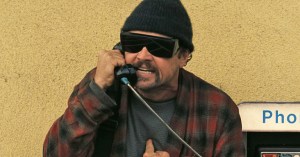RT Interview: Morgan Spurlock on the Personal, the Political and Osama bin Laden
The documentarian comes over all Kandahar.
 With his first documentary, Super Size Me, Morgan Spurlock used his own body to examine America’s culture of obesity. And now with Where in the World Is Osama Bin Laden? he once again puts himself front and centre to look at the so-called “war on terror”. The result is a strange hybrid of movie styles that opts for entertainment rather than provocation.
With his first documentary, Super Size Me, Morgan Spurlock used his own body to examine America’s culture of obesity. And now with Where in the World Is Osama Bin Laden? he once again puts himself front and centre to look at the so-called “war on terror”. The result is a strange hybrid of movie styles that opts for entertainment rather than provocation.
In person, he’s surprisingly tall (6’2) and a very youthful 37, even with that trademark redneck-style handlebar moustache. He’s also open and friendly, so it’s immediately clear why he puts the interviewees in his films at ease. We start with the genre question…
How do you describe this film? It’s a comedy, road movie, political documentary mash-up.
Morgan Spurlock: I think that’s a genre all to itself. I’m in a genre of one!
The other docs about Iraq and Afghanistan are much more serious. The Oscar winner Taxi to the Dark Side and Errol Morris‘ Standard Operating Procedure are virtually horror films. How does your film sit alongside them?
MS: I think mine’s funnier. Taxi to the Dark Side is an incredible film and a very scary movie. Alex Gibney is an amazing filmmaker. And Errol Morris makes some of the most beautiful films ever. Someone once asked me to compare my films to his, and I said, “Well, Errol Morris makes poetry; I make popcorn.” I try to make films for a very general audience. I really don’t want to preach to the choir.

Well, you definitely take a more personal, less political approach.
MS: When we started this whole journey, we talked to a lot of politicians who give you the same answer that every politician gives you. For this movie, we shot 900 hours of footage and had about 100 hours of archival material, so we could have gone in three or four different directions. But for me it was a personal journey. What I think the film does really well is that it gives a voice and shows people that I don’t see on television or hear their points of view. And I think that to get to see inside their homes is really nice.
And then there’s the fact that you’re doing this because your wife is pregnant.
MS: We were about two months into preproduction on the film, looking at how you find Osama bin Laden, when we found out Alex was pregnant. Oh, well maybe we shouldn’t do this then! But when she and I started talking about it, she became supportive, because it wasn’t just where is he and why haven’t we caught him or what created him, but what kind of world am I going to bring a kid into. And that really resonated with her as well.

Did you know from the start that you were going to focus on everyday people?
MS: No, not until we got overseas and started talking to them. I knew I wanted to talk to somebody like me – a young father who either is going to have a baby or already has a baby. And once we did the first family interview in Egypt, I said we have to do this everywhere. We were talking to people on the streets who don’t have any vested interest in being re-elected. To have that type of real honesty is rare.
In the film, you travel from Morocco to Egypt, Israel, Jordan, Saudi Arabia, Afghanistan and Pakistan. What would a making-of doc be like – On the Road With Morgan?
MS: It was a nightmare. There were definitely things that happened to us that were funnier than what’s on screen, but you can’t put that in there. There were multiple times that somebody got some sort of stomach illness from the food that we were eating. I was laid up a couple of times. Our security advisor was laid up for three days when we were on the base in Kandahar from something we ate while we were out in one of the villages. I’ll try anything, but our local fixers were saying, “You can’t eat that,” and I was like, “Why not? They eat it!” And you’re eating this thing on a stick, and I’m asking, “What is it?” And the fixer says, “They said it’s goat.” And I whisper, “Is it goat?” And the fixer just looks at me as if to say, “That is not goat.” Like it’s some kind of wild Afghan dog. Don’t ask, just eat it and nod, “Mmm, good!”

There must have been some scary situations too?
MS: Well, we were embedded with the troops, and those guys are targets every day. When we first got to Afghanistan we were staying in a guest hotel, and in the middle of the night somebody started banging on my room. This was just after our security advisor had told us that if someone knocks, don’t answer your door, because people had been killed and kidnapped in that environment. So I was like, “Who is it?” And they just keep knocking. So I’m calling our security advisor on the radio, and there’s no answer. Finally I picked up the heaviest object in the room, and I’m standing next to the door, and they keep knocking. And after about 20 minutes they went away. So the next morning we asked the employees, who said, “We have no idea. We didn’t see anyone.” It was scary, and that was my first night in Kabul. And then right before the film opened, just down the road from where we were staying, the Taliban ambushed a hotel and killed I don’t know how many people. Actually, it’s gotten more dangerous in Kabul than when we were there.
Did the experience change your view of America?
MS: Personally, I have this vision of how I want America to be. But you really get a sense of how untrue a lot of the things are when you get overseas, when you talk to people who live in “democracies” that are backed by the US, where the people are oppressed and tortured for speaking out against the government. These people say: “Isn’t it democracy that your country’s all about?” And it’s a lot different hearing somebody say that on television when you can change the channel – enough of that guy, let’s go watch something funny. But here you are in somebody’s home, and you can’t turn it off. You have to really listen to them explain everything that’s happened to them and their families and their neighbours. And it does start to shift your perspective.

Did it change your opinion of Osama bin Laden himself?
MS: No, I think it changed my perspective in terms of what pushes people to follow someone like Osama bin Laden. Because here’s this guy who has kind of manipulated religious teaching for his own political gain to push his agenda, and here are people who have bought into that for a lot of the wrong reasons. There’s families that don’t have any money and don’t have a lot of opportunity. There’s people who feel like they’ve been completely oppressed by their government, which has been backed by the United States. And you start to see the domino effect of what happens. So for me that was the real eye-opener. I think it will affect everything in my life from now on. You can’t go on a trip like this and come home and put blinders back on and be unaffected. You can’t just ignore it.
Does this mean your next film will be more political?
MS: I don’t know. I grew up in a family of educators, so I think there’s a fantastic movie to be made about the public education system. It would be nice to try and do something like that before my kid actually goes to school.
So your son is going to be the bookmark for your whole career.
MS: Yeah, it’ll be like, “Dad, enough about me!”






